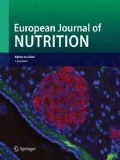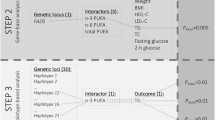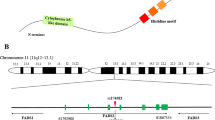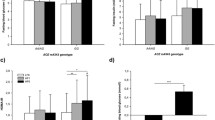Abstract
Purpose
Delta-5-desaturase (fatty acid desaturase-1, FADS1) and delta-6 desaturase (fatty acid desaturase-2, FADS2), rate-limiting enzymes in the biosynthesis of long-chain polyunsaturated fatty acids, may be associated with the risk of metabolic syndrome (MetS). We investigated how FADS1 rs174547 and FADS2 rs2845573 variants modify the prevalence of MetS and whether the risk is modulated by interactions with dietary fat.
Methods
Genetic, anthropometric, biochemical, and dietary data were collected from the Ansan/Ansung (8842 adults) and City–Rural (5512 adults) cohorts in Korea. The association between FADS1 rs174547(C/T) and FADS2 rs2845573(C/T) variants and MetS was analyzed, as was the interaction of genotypes and fatty acid intake and the risk of MetS after adjusting for MetS-related confounders.
Results
Carriers of FADS1 rs174547 and FADS2 rs2845573 minor alleles had lower serum HDL-cholesterol and glucose levels and higher triglyceride levels than those with major alleles. Ansan/Ansung cohort individuals with FADS1 minor alleles or haplotypes of FADS1 and FADS2 minor alleles had increased risk of MetS, including lower serum HDL-cholesterol and triglyceride levels and blood pressure after adjusting for MetS-related confounders. The City–Rural cohort showed similar results. Total fat intake showed interactions with FADS1 and haplotype variants on MetS risk: MetS frequency was reduced in people consuming moderate fat diets as compared to low fat diets in FADS1 and haplotype of FADS1 and FADS2 major alleles.
Conclusion
Korean carriers of the FADS1 rs174547 and FADS2 rs2845573 minor alleles have a greater susceptibility to MetS and moderate fat intake protected against the risk of MetS in carriers of the FADS1 major alleles.


Similar content being viewed by others
Abbreviations
- MetS:
-
Metabolic syndrome
- SFA:
-
Saturated fatty acids
- MUFA:
-
Monounsaturated fatty acids
- PUFA:
-
Polyunsaturated fatty acids
- LC-PUFA:
-
Long-chain polyunsaturated fatty acids
- FADS:
-
Fatty acid desaturase
- EPA:
-
Eicosapentaenoic acid
- DHA:
-
Docosahexaenoic acid
- KoGES:
-
Korean Genome Epidemiology Study
- BMI:
-
Body mass index
- TG:
-
Triglycerides
- SNP:
-
Single-nucleotide polymorphism
- HWE:
-
Hardy–Weinberg equilibrium
References
Dandona P, Ghanim H, Chaudhuri A, Dhindsa S, Kim SS (2010) Macronutrient intake induces oxidative and inflammatory stress: potential relevance to atherosclerosis and insulin resistance. Exp Mol Med 42:245–253
Rosin BL (2007) The progression of cardiovascular risk to cardiovascular disease. Rev Cardiovasc Med 8(Suppl 4):S3-8
Bano KA, Batool A (2007) Metabolic syndrome, cardiovascular disease and type-2 diabetes. J Pak Med Assoc 57:511–515
Kang Y, Kim J (2016) Gender difference on the association between dietary patterns and metabolic syndrome in Korean population. Eur J Nutr 55:2321–2330
Park S, Ahn J, Lee BK (2016) Very-low-fat diets may be associated with increased risk of metabolic syndrome in the adult population. Clin Nutr 35:1159–1167
Nakamura MT, Nara TY (2004) Structure, function, and dietary regulation of delta6, delta5, and delta9 desaturases. Annu Rev Nutr 24:345–376
Glaser C, Heinrich J, Koletzko B (2010) Role of FADS1 and FADS2 polymorphisms in polyunsaturated fatty acid metabolism. Metabolism 59:993–999
Vessby B (2003) Dietary fat, fatty acid composition in plasma and the metabolic syndrome. Curr Opin Lipidol 14:15–19
Rzehak P, Heinrich J, Klopp N, Schaeffer L, Hoff S, Wolfram G et al (2009) Evidence for an association between genetic variants of the fatty acid desaturase 1 fatty acid desaturase 2 (FADS1 FADS2) gene cluster and the fatty acid composition of erythrocyte membranes. Br J Nutr 101:20–26
Sergeant S, Hugenschmidt CE, Rudock ME, Ziegler JT, Ivester P, Ainsworth HC et al (2012) Differences in arachidonic acid levels and fatty acid desaturase (FADS) gene variants in African Americans and European Americans with diabetes or the metabolic syndrome. Br J Nutr 107:547–555
Al-Hilal M, Alsaleh A, Maniou Z, Lewis FJ, Hall WL, Sanders TA et al (2013) Genetic variation at the FADS1-FADS2 gene locus influences delta-5 desaturase activity and LC-PUFA proportions after fish oil supplement. J Lipid Res 54:542–551
Gonzalez-Casanova I, Rzehak P, Stein AD, Garcia Feregrino R, Dommarco JA, Barraza-Villarreal A et al (2016) Maternal single nucleotide polymorphisms in the fatty acid desaturase 1 and 2 coding regions modify the impact of prenatal supplementation with DHA on birth weight. Am J Clin Nutr 103:1171–1178
Merino DM, Johnston H, Clarke S, Roke K, Nielsen D, Badawi A et al (2011) Polymorphisms in FADS1 and FADS2 alter desaturase activity in young Caucasian and Asian adults. Mol Genet Metab 103:171–178
Storey ML, Anderson PA (2015) Changes in mean intake of fatty acids and intake of saturated and trans fats from potatoes: NHANES 2005–2006, 2007–2008, and 2009–2010. Adv Nutr 6:376 s-382 s
Hellstrand S, Ericson U, Gullberg B, Hedblad B, Orho-Melander M, Sonestedt E (2014) Genetic variation in FADS1 has little effect on the association between dietary PUFA intake and cardiovascular disease. J Nutr 144:1356–1363
Bedogni G, Malavolti M, Severi S, Poli M, Mussi C, Fantuzzi AL et al (2002) Accuracy of an eight-point tactile-electrode impedance method in the assessment of total body water. Eur J Clin Nutr 56:1143–1148
Park S, Ham JO, Lee BK (2015) Effects of total vitamin A, vitamin C, and fruit intake on risk for metabolic syndrome in Korean women and men. Nutrition 31:111–118
Park S, Daily JW, Zhang X, Jin HS, Lee HJ, Lee YH (2016) Interactions with the MC4R rs17782313 variant, mental stress and energy intake and the risk of obesity in Genome Epidemiology Study. Nutr Metab (Lond) 13:38
Rabbee N, Speed TP (2006) A genotype calling algorithm for affymetrix SNP arrays. Bioinformatics 22:7–12
Ribaya-Mercado JD (2002) Influence of dietary fat on beta-carotene absorption and bioconversion into vitamin A. Nutr Rev 60:104–110
Park S, Ahn J, Kim NS, Lee BK (2017) High carbohydrate diets are positively associated with the risk of metabolic syndrome irrespective to fatty acid composition in women: the KNHANES 2007–2014. Int J Food Sci Nutr 68:479–487
Das M, Pal S, Ghosh A (2010) Association of metabolic syndrome with obesity measures, metabolic profiles, and intake of dietary fatty acids in people of Asian Indian origin. J Cardiovasc Dis Res 1:130–135
Liu SJ, Zhi H, Chen PZ, Chen W, Lu F, Ma GS et al (2012) Fatty acid desaturase 1 polymorphisms are associated with coronary heart disease in a Chinese population. Chin Med J (Engl) 125:801–806
Hellstrand S, Sonestedt E, Ericson U, Gullberg B, Wirfält E, Hedblad B et al (2012) Intake levels of dietary long-chain PUFAs modify the association between genetic variation in FADS and LDL-C. J Lipid Res 53:1183–1189
Tanaka T, Shen J, Abecasis GR, Kisialiou A, Ordovas JM, Guralnik JM et al (2009) Genome-wide association study of plasma polyunsaturated fatty acids in the InCHIANTI Study. PLoS Genet 5:e1000338
Aulchenko YS, Ripatti S, Lindqvist I, Boomsma D, Heid IM, Pramstaller PP et al (2009) Loci influencing lipid levels and coronary heart disease risk in 16 European population cohorts. Nat Genet 41:47–55
Gieger C, Geistlinger L, Altmaier E, Hrabe de Angelis M, Kronenberg F, Meitinger T et al (2008) Genetics meets metabolomics: a genome-wide association study of metabolite profiles in human serum. PLoS Genet 4:e1000282
Lemaitre RN, Tanaka T, Tang W, Manichaikul A, Foy M, Kabagambe EK et al (2011) Genetic loci associated with plasma phospholipid n-3 fatty acids: a meta-analysis of genome-wide association studies from the CHARGE Consortium. PLoS Genet 7:e1002193
Lattka E, Illig T, Heinrich J, Koletzko B (2010) Do FADS genotypes enhance our knowledge about fatty acid related phenotypes? Clin Nutr 29:277–287
Takkunen MJ, de Mello VD, Schwab US, Kuusisto J, Vaittinen M, Agren JJ et al (2016) Gene-diet interaction of a common FADS1 variant with marine polyunsaturated fatty acids for fatty acid composition in plasma and erythrocytes among men. Mol Nutr Food Res 60:381–389
Ahn Y, Kwon E, Shim JE, Park MK, Joo Y, Kimm K et al (2007) Validation and reproducibility of food frequency questionnaire for Korean genome epidemiologic study. Eur J Clin Nutr 61:1435–1441
Funding
This study has been financially supported by Korea Research Foundation (NRF-2015R1D1A3A01019577) and Traditional Culture Convergence Research Program through the National Research Foundation of Korea(NRF) funded by the Ministry of Science and ICT (NRF- 2016M3C1B5907152).
Author information
Authors and Affiliations
Contributions
SP participated in the experimental design, analyzed the data and wrote the manuscript; XZ analyzed the data; and SK participated in discussing the results and writing the manuscript. All authors listed in a manuscript have contributed substantially to the work and have seen and approved the submitted version. This paper has not been published previously, is not under consideration for publication elsewhere.
Corresponding author
Ethics declarations
Conflict of interest
The authors have no conflicts of interest to disclosure.
Ethical approval
This study was approved by the Institutional Review Board of the Korean National Institute of Health for the KoGES. Written informed consent was obtained from all subjects.
Informed consent
Informed consent was obtained from all individual participants included in the KoGES study.
Rights and permissions
About this article
Cite this article
Park, S., Kim, D.S. & Kang, S. Carrying minor allele of FADS1 and haplotype of FADS1 and FADS2 increased the risk of metabolic syndrome and moderate but not low fat diets lowered the risk in two Korean cohorts. Eur J Nutr 58, 831–842 (2019). https://doi.org/10.1007/s00394-018-1719-9
Received:
Accepted:
Published:
Issue Date:
DOI: https://doi.org/10.1007/s00394-018-1719-9




